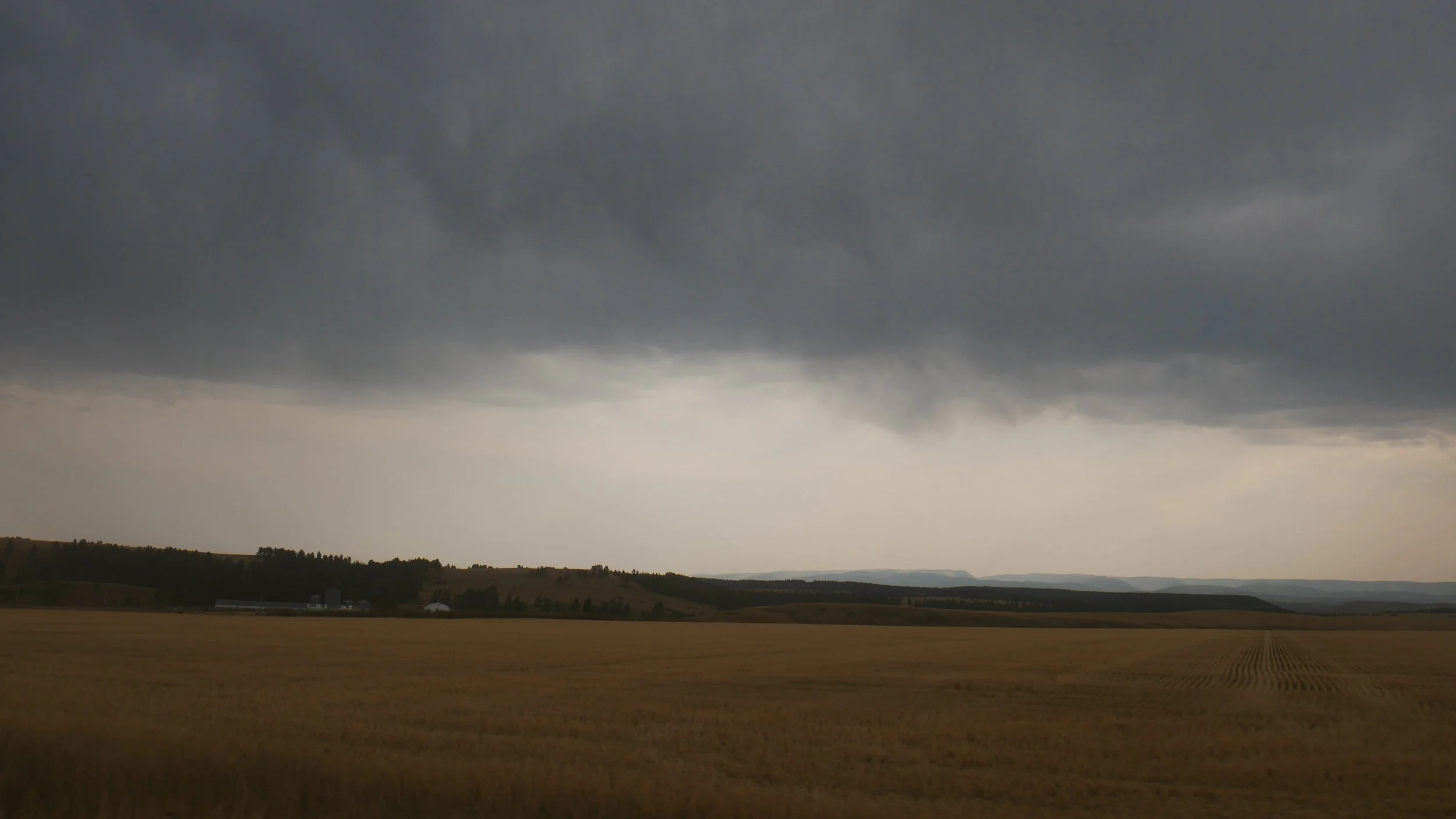Caylin Capra-Thomas
Sister Twister
Last week you sent a picture: flooded sedans
under a bridge, tornado near us in Oak Park.
I was in St. Louis, at the airport where every bathroom
is a tornado shelter, and every year here
the sky drops down to punish something — the land,
to eat its richness and bring whatever dares to rise
down a notch, every notch, to level whatever
climbs so we can begin again — again.
I didn’t say any of that, just then, or ever — who
talks like this? — and when I say we can begin
again, I don’t know who we are, or why we always
must, but I remembered your first tornado because
it was also mine. You were a baby, I was ten.
Breezy Acres, the waterslides by the reservoir
with charcoal grills and signs that said
No horseplay. I was afraid of horses anyway
but I loved the curly fries at the snack bar
and I was walking back with some
when everything clouded over and the wind picked
up. I looked for dad where he’d been
reading John Grisham by the water,
his knees up in that low, faded beach chair
but he was running, and your mom too,
and you were in your car seat, the wind
nearly lifting you out. Calm as anything
but frowning. Spooky. And then I saw it.
God’s grey mouth funneling down,
hungry. I ran, hunched over my food
and dropping rain-slicked plastic Heinz
packets as I went. We laughed about this
once the thing had passed. My instinct —
save the fries. You don’t remember this.
You were just a little thing, little storms
gathering at your brow. One day, new
gods would tear through you, grim, lope
across your surface, one called worry,
another wine. You would know them
as only a true believer could: in body
and in blood. You weren’t aware of this then,
and neither was the twister, but I remember
now, looking at your photo of the flood,
shivering next to you in my wet suit
while I struggled with the corrugated edge
of a ketchup packet, how something dawned
over your dark silence when at last
the little vessel gave up
all its gloss,
its guts.
Armoire
Does there exist a single dreamer of words who does not respond to the word wardrobe?
—Gaston Bachelard, The Poetics of Space, with two lines borrowed from that work to open.
A lock is a psychological threshold. A lock
is an invitation to thieves. I never had one
for my wardrobe, built solid by Enrico,
my Piacentino forefather, and where I hid
big jugs of Carlo Rossi under sundresses and
long scarves. It meant more to my mother
than to me. She remembers him — Enrico.
Remembers him rising early to deliver bread,
quiet on the drive, quiet as he nodded off
while nursing a snifter of nocino. My mother
stores that remembering in the wardrobe,
gliding a hand over its streaked blonde
wood and murmuring, She no lucky, that girl —
something Enrico used to say to her. Luck
has something to do with how you look
at it. A psychological thresher, reaping
what you forget you’ve sewn. Like, once,
in Burlington and underage, I found a full bottle
of blackberry brandy on the downtown
bus, drank half sitting semi-circled
with some boys who hadn’t hurt me
yet. What luck, I thought, and then I brought
the bottle home and hid it in my hamper
way down into the white wicker, below
heaps of tube tops and dirty low-rise denim
I’d forbidden anyone else to wash.
Over the course of that summer, I forgot
about the brandy. (It wasn’t in the wardrobe,
which, actually, my mother called an armoire,
knowing how dresses can be fashioned
into weapons.) And when at last I exhumed
the bottle from its sordid secret spot, I found it,
and my laundry, my hands and my forearms, all
thronged with hammered ants. That, too, is luck,
and I spent the afternoon sober as an executioner.
What was I to do? This was their destiny, as it was mine
to destroy them, as it was my mother’s to marry
three thunders with silence bottled in their centers,
as it was Enrico’s to leave Piacenza for Boston
just to marry a girl from Parma and make pizza and be
a mystery to his son, his granddaughter, to me.
Some thirty miles east of his birthplace, near Cremona,
a man with his same first and family names was born
and lived and died in one house, which he never
stopped refurbishing. He never married but for
the balconies and balustrades, carved columns,
a colossal dome. I’d like to see it someday,
even though both men were perfect strangers to me.
Such arduous adornment. The armoire
Enrico built — the unlocked but unopened
chest of every man I’ve never known.
Caylin Capra-Thomas is the author of a poetry collection, Iguana Iguana, and her poetry, essays, and scholarship have appeared widely, including in Georgia Review, Pleiades, Longreads, 32 Poems, New England Review, and elsewhere. The recipient of fellowships from the Vermont Studio Center and the Sewanee Writers Conference, she earned a PhD in English from the University of Missouri in Columbia, where she now teaches English and creative writing at Stephens College.
Artwork: “Swallow the Whole Sky” by Daniel Lurie
Digital

